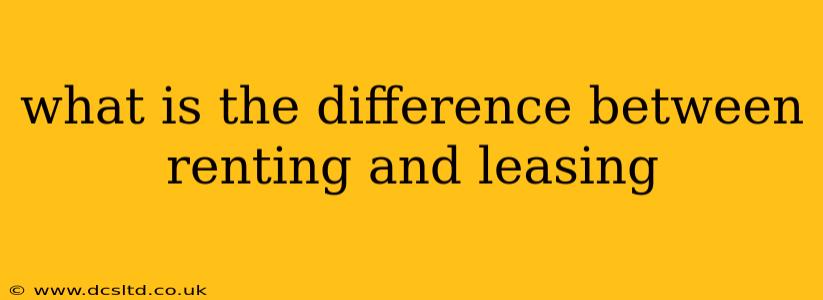What's the Difference Between Renting and Leasing?
The terms "renting" and "leasing" are often used interchangeably, leading to confusion. While they both involve the temporary use of property in exchange for payment, there are key distinctions. Understanding these differences is crucial before signing any agreement, as the legal implications and responsibilities can vary significantly.
What is Renting?
Renting typically refers to a shorter-term agreement for the use of property, usually residential. A rental agreement is often month-to-month, providing greater flexibility for both the tenant and landlord. Rent is paid periodically, and the tenant generally has fewer responsibilities regarding maintenance and repairs compared to a lease agreement. Think of renting as a more informal, flexible arrangement.
What is Leasing?
Leasing, on the other hand, usually involves a longer-term agreement, often for several months or even years. Lease agreements are generally more formal and detailed than rental agreements, outlining specific responsibilities and obligations for both the tenant (lessee) and the landlord (lessor). Leases frequently involve a higher level of commitment and may include clauses regarding property maintenance, repairs, and lease renewals. Commercial properties are almost always leased, but leases can also apply to residential properties.
What are the key differences between renting and leasing?
Here's a table summarizing the key differences:
| Feature | Renting | Leasing |
|---|---|---|
| Term Length | Typically shorter, month-to-month | Typically longer, several months to years |
| Agreement | Less formal, simpler agreement | More formal, detailed written agreement |
| Flexibility | More flexible for both parties | Less flexible, more commitment required |
| Maintenance | Landlord typically handles major repairs | Responsibilities may be shared or specified |
| Renewals | Easier to terminate or renew | Renewal clauses often included in the agreement |
| Typical Use | Often residential, short-term stays | Often residential or commercial, long-term |
What are the legal implications?
The legal implications differ depending on the jurisdiction and the specifics of the agreement. However, generally, lease agreements offer more legal protection to both the landlord and tenant due to their formal nature. Rental agreements, being less formal, might leave more room for interpretation and potential disputes. Always seek legal advice if you are unsure about any clauses in your agreement.
What are the typical costs involved?
Both renting and leasing involve periodic payments for the use of the property. However, leasing might involve additional upfront costs, such as security deposits, lease signing fees, or even advance rent payments. Rental agreements often have less upfront cost.
What if I break the agreement?
Breaking a rental agreement is typically easier than breaking a lease agreement. Lease agreements often include clauses regarding early termination penalties, which could result in financial repercussions. Always carefully review the terms and conditions of your agreement before signing.
Is one better than the other?
Neither renting nor leasing is inherently "better." The best option depends on individual needs and circumstances. If you need flexibility and a short-term arrangement, renting might be preferable. If you need stability and a longer-term commitment, leasing might be a better fit. Careful consideration of your individual needs and a thorough review of the agreement are crucial in making the right decision.
